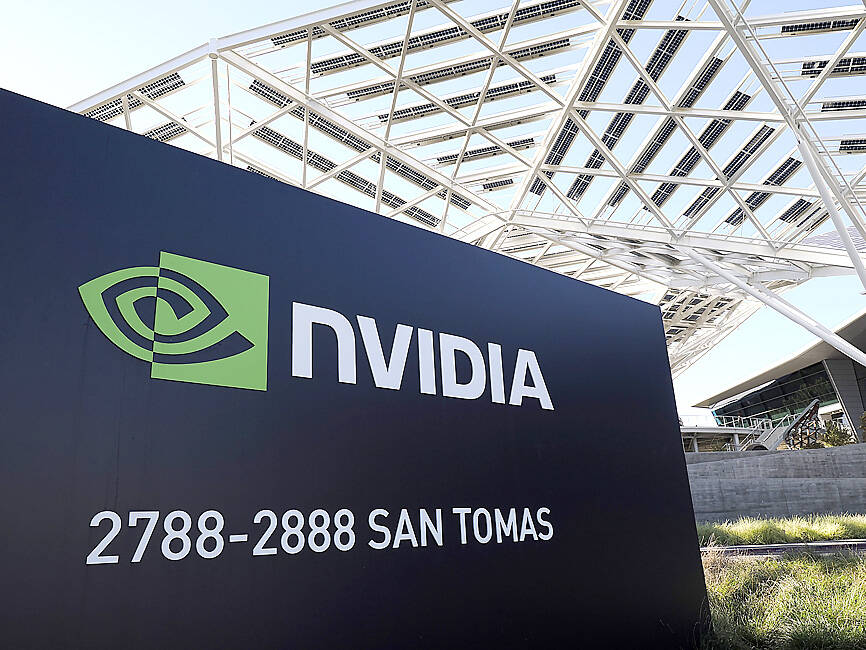The Ministry of Economic Affairs (MOEA) yesterday approved an application from US artificial intelligence chip giant Nvidia Corp to set up a subsidiary in Taiwan.
Nvidia is to invest NT$1 billion (US$32.12 million) to set up the Taiwanese subsidiary, the ministry said.
The ministry had approved Nvidia’s application to set up a subsidiary in late September, but the US company resubmitted its application on Wednesday last week, raising its investment to NT$1 billion.

Photo: EPA
Taipei Mayor Chiang Wan-an (蔣萬安) had told reporters on Thursday that when he met with Scott Ekman, Nvidia’s global vice president for real estate and site services, on Tuesday, he was told that Nvidia was in the process of opening a subsidiary in Taiwan.
Nvidia has three branches registered in Taiwan: Nvidia Hong Kong Holdings Ltd, Taiwan branch, Nvidia (BVI) Holdings Ltd, Taiwan branch, and Singapore Development Pte, Taiwan branch.
Nvidia has not said why it applied for a subsidiary in Taiwan at this time, but having a subsidiary means it can independently hold assets, make large-scale purchases, sign more complex contracts, and have more flexibility in handling local tax and research-and-development funding issues.
That is because, unlike a branch, a subsidiary is an independent legal entity from its parent company, and has its own liabilities, assets and tax obligations.
Edman also provided a letter of intent to build its Taiwanese headquarters in the Beitou Shilin Tech Park when he met with Chiang on Tuesday.
Chiang said he and Edman are expected to meet again ahead of the Lunar New Year holiday in February to sign an agreement on the Taiwanese headquarters project.
Taipei is clearing the way for Nvidia to build the headquarters. It is in the process of terminating a contract giving the surface rights to Shin Kong Life Insurance Co (新光人壽) for the T17 and T18 lots in the science park, where Nvidia wants to build its Taiwan headquarters.
The city government has proposed a payment of NT$4.43 billion for the insurer to relinquish the land use rights before transferring it to Nvidia.
Shin Kong Life was scheduled to hold a special board meeting yesterday afternoon to discuss the contract termination.
Taipei Deputy Mayor Lee Shu-chuan (李四川) yesterday said the city and the company could sign an agreement to complete the deal next week.
Shin Kong Life obtained the land’s surface rights in 2021 after winning a public tender, but has yet to begin development.
The city government objected to allowing the insurer to directly transfer the rights to Nvidia, citing concerns about potential profiteering, and requested a mutual contract termination.

CHIP RACE: Three years of overbroad export controls drove foreign competitors to pursue their own AI chips, and ‘cost US taxpayers billions of dollars,’ Nvidia said China has figured out the US strategy for allowing it to buy Nvidia Corp’s H200s and is rejecting the artificial intelligence (AI) chip in favor of domestically developed semiconductors, White House AI adviser David Sacks said, citing news reports. US President Donald Trump on Monday said that he would allow shipments of Nvidia’s H200 chips to China, part of an administration effort backed by Sacks to challenge Chinese tech champions such as Huawei Technologies Co (華為) by bringing US competition to their home market. On Friday, Sacks signaled that he was uncertain about whether that approach would work. “They’re rejecting our chips,” Sacks

NATIONAL SECURITY: Intel’s testing of ACM tools despite US government control ‘highlights egregious gaps in US technology protection policies,’ a former official said Chipmaker Intel Corp has tested chipmaking tools this year from a toolmaker with deep roots in China and two overseas units that were targeted by US sanctions, according to two sources with direct knowledge of the matter. Intel, which fended off calls for its CEO’s resignation from US President Donald Trump in August over his alleged ties to China, got the tools from ACM Research Inc, a Fremont, California-based producer of chipmaking equipment. Two of ACM’s units, based in Shanghai and South Korea, were among a number of firms barred last year from receiving US technology over claims they have

It is challenging to build infrastructure in much of Europe. Constrained budgets and polarized politics tend to undermine long-term projects, forcing officials to react to emergencies rather than plan for the future. Not in Austria. Today, the country is to officially open its Koralmbahn tunnel, the 5.9 billion euro (US$6.9 billion) centerpiece of a groundbreaking new railway that will eventually run from Poland’s Baltic coast to the Adriatic Sea, transforming travel within Austria and positioning the Alpine nation at the forefront of logistics in Europe. “It is Austria’s biggest socio-economic experiment in over a century,” said Eric Kirschner, an economist at Graz-based Joanneum

OPTION: Uber said it could provide higher pay for batch trips, if incentives for batching is not removed entirely, as the latter would force it to pass on the costs to consumers Uber Technologies Inc yesterday warned that proposed restrictions on batching orders and minimum wages could prompt a NT$20 delivery fee increase in Taiwan, as lower efficiency would drive up costs. Uber CEO Dara Khosrowshahi made the remarks yesterday during his visit to Taiwan. He is on a multileg trip to the region, which includes stops in South Korea and Japan. His visit coincided the release last month of the Ministry of Labor’s draft bill on the delivery sector, which aims to safeguard delivery workers’ rights and improve their welfare. The ministry set the minimum pay for local food delivery drivers at